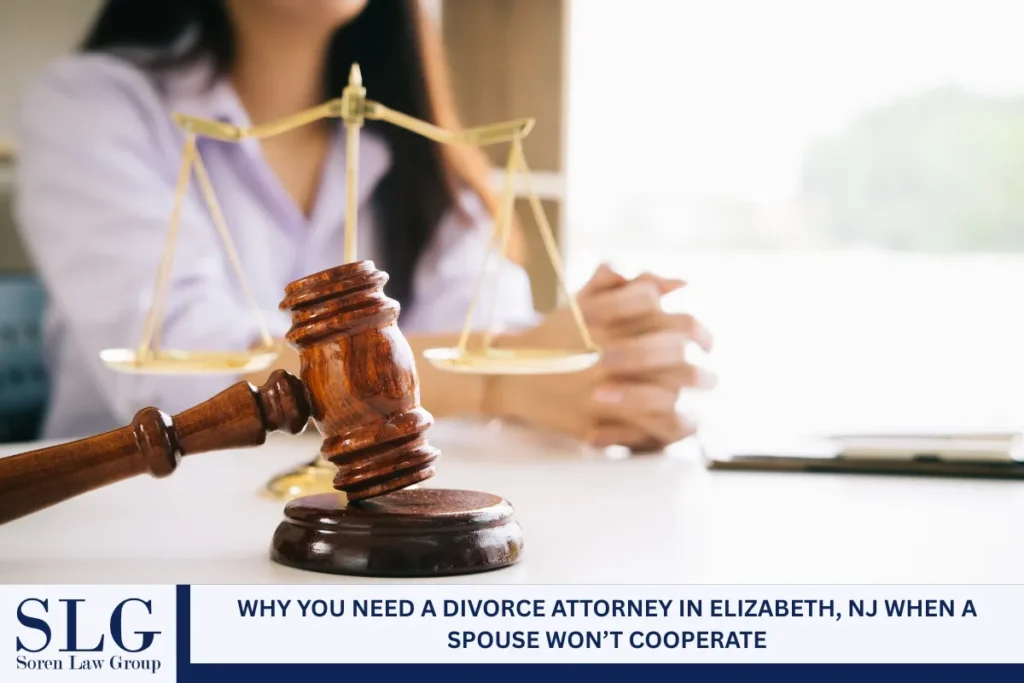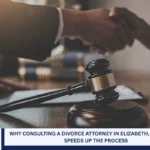Going through a divorce is never easy, and it becomes even more difficult when one party refuses to cooperate. In Elizabeth, NJ, the complexities of divorce are compounded when a spouse deliberately avoids or obstructs the legal process. Hiring a divorce attorney in such circumstances is crucial to ensure that your rights are protected, the divorce process is as smooth as possible, and the best possible outcome is achieved for you and your family.
Understanding the Impact of an Uncooperative Spouse

An uncooperative spouse during a divorce can present numerous challenges. The refusal to engage in the process can result in extended delays, legal frustration, and an overall sense of helplessness. This can impact everything from the division of assets to child custody agreements. It’s important to understand how an uncooperative spouse can affect your case and why professional legal assistance is necessary to navigate such obstacles.
What Constitutes an Uncooperative Spouse?
An uncooperative spouse can take many forms during a divorce. Some examples of their behavior may include:
- Failure to respond to divorce papers: This is a common tactic that prolongs the process and leaves the other spouse waiting indefinitely.
- Avoidance of negotiations or mediation: A spouse who refuses to negotiate or take part in mediation sessions can prevent you from reaching a reasonable settlement.
- Non-disclosure of financial information: Hiding assets or refusing to share financial details can result in an unfair division of property.
- Refusal to agree on child custody or visitation: A non-cooperative spouse may delay or block custody agreements, putting unnecessary stress on the children involved.
When faced with an uncooperative spouse, the need for a divorce attorney becomes critical. These behaviors, while challenging, are not uncommon in divorce cases, and a seasoned attorney will know exactly how to proceed under such conditions.
The Essential Role of a Divorce Attorney in Elizabeth, NJ
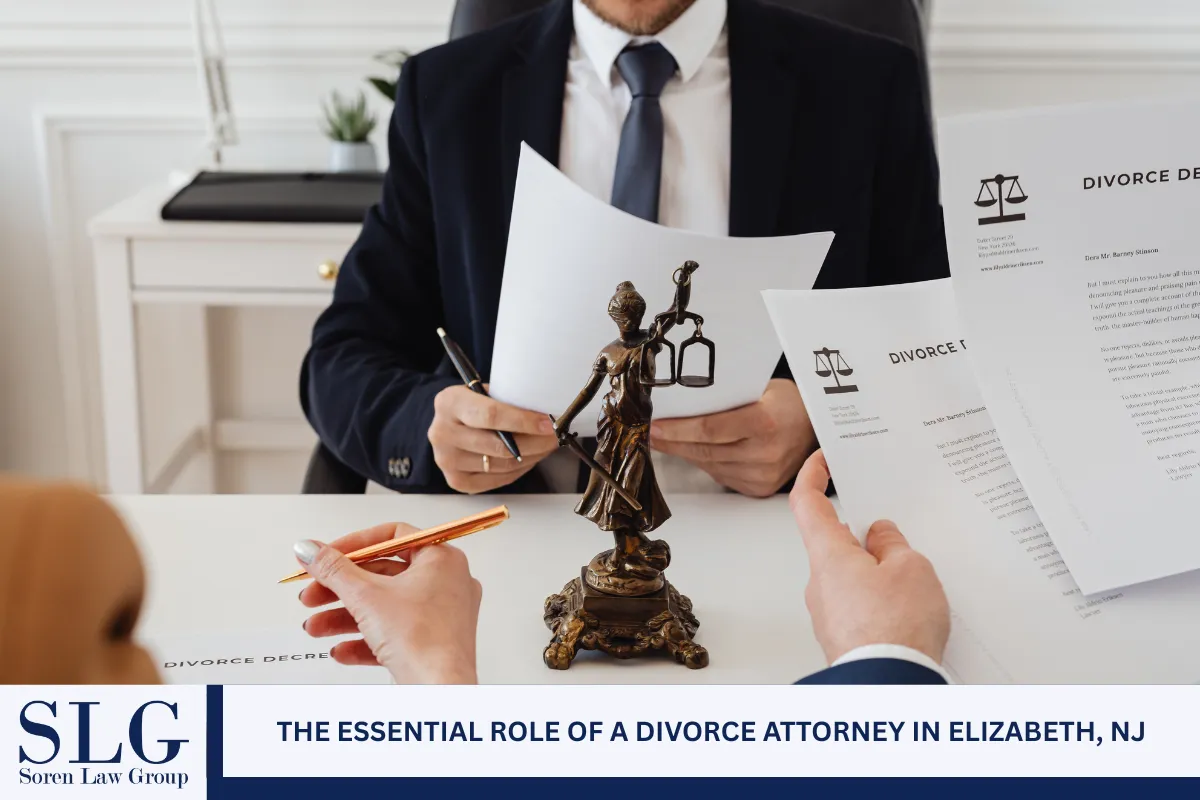
Divorce laws can be complex, and the circumstances of an uncooperative spouse can make the situation even more challenging. A divorce attorney in Elizabeth, NJ, will be your advocate, ensuring that your rights are protected and helping to move the case forward. Their role becomes indispensable when your spouse refuses to cooperate, as they can guide you through the intricacies of local family law.
Legal Expertise and Knowledge of New Jersey Divorce Law
Divorce attorneys possess in-depth knowledge of family law and the specific divorce regulations in New Jersey. For example, New Jersey is an equitable distribution state, meaning that marital property is divided fairly but not necessarily equally. An experienced attorney can ensure that the property division process is handled properly, even when one spouse is obstructing it.
Additionally, an attorney can help you understand your rights and responsibilities, whether you are seeking spousal support, child support, or a fair division of assets. This knowledge is crucial in navigating the often complicated and emotionally charged divorce process.
Protection of Your Rights and Interests
When your spouse refuses to cooperate, it can feel like you’re at a disadvantage, but with a divorce attorney, you can ensure that your interests are safeguarded. A skilled attorney can handle negotiations on your behalf, ensuring that your financial and personal needs are met. They will work to protect your rights regarding the division of assets, child custody, and even alimony, helping to ensure that you don’t get unfairly treated during the divorce process.
Advancing the Divorce Process
An uncooperative spouse can unnecessarily drag out the divorce process, but your divorce attorney will know how to speed things up. They can file the appropriate motions and petitions with the court to ensure that the divorce proceeds despite your spouse’s refusal to cooperate. Whether through legal steps such as requesting temporary relief or filing motions to compel action, an experienced attorney is well-equipped to keep things moving forward.
How a Divorce Attorney Can Address Specific Issues
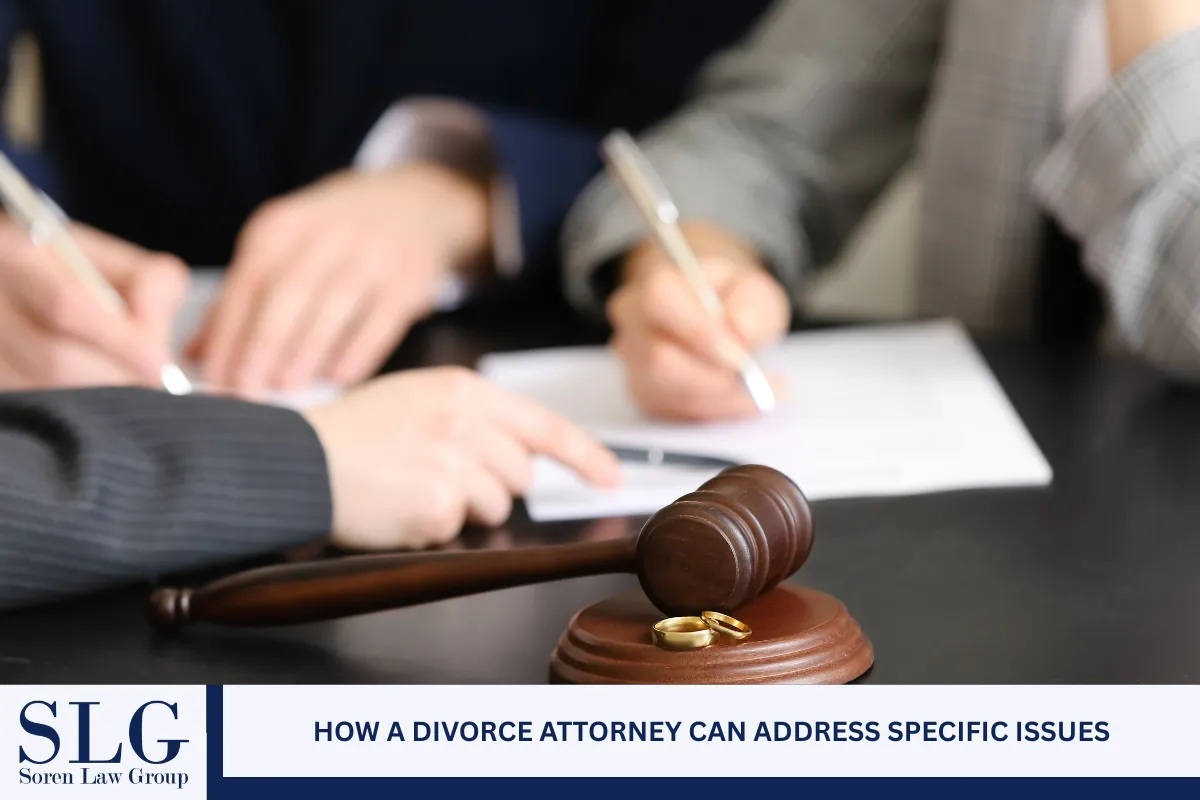
Resolving Child Custody and Visitation Disputes
If your spouse refuses to cooperate, issues related to child custody can become highly contentious. In Elizabeth, NJ, family courts prioritize the best interests of the child, but your attorney’s intervention becomes necessary when your spouse is being uncooperative. A divorce attorney will fight for the best possible custody arrangement, whether it’s for physical custody, legal custody, or a fair visitation schedule. Your attorney will present evidence, recommend custody plans, and work tirelessly to ensure that the children’s needs are met and protected.
Asset Division: Navigating Financial Disputes
An uncooperative spouse can try to hide assets or delay the division of property, making it essential for you to have an attorney who can protect your financial interests. A divorce attorney will work with forensic accountants and other experts to ensure that all assets, from retirement funds to real estate, are accounted for. They will also ensure that your spouse does not have an unfair advantage during the distribution process. New Jersey follows equitable distribution laws, which means property will be divided in a way that’s considered fair by the court, even if it’s not an equal split.
Spousal Support and Alimony Disagreements
Spousal support can be a contentious issue in any divorce, especially when a spouse refuses to cooperate. Your divorce attorney will help negotiate or litigate on your behalf, ensuring that you receive fair financial support after the divorce or that you aren’t unfairly burdened with unreasonable alimony payments. Your attorney will factor in various elements, such as the length of the marriage, financial need, and the standard of living during the marriage, to help secure a fair alimony arrangement.
The Importance of Local Expertise in Elizabeth, NJ Divorce Cases

Elizabeth, NJ, has unique divorce laws that require an attorney with local experience to navigate them successfully. New Jersey’s family law system places significant emphasis on equitable distribution and child custody matters, and your attorney must be familiar with how these laws are applied in Union County. Working with a local attorney ensures that your case is handled with a deep understanding of the court’s preferences and the best approach for achieving a favorable result.
Elizabeth Divorce Attorney – Soren Law Group
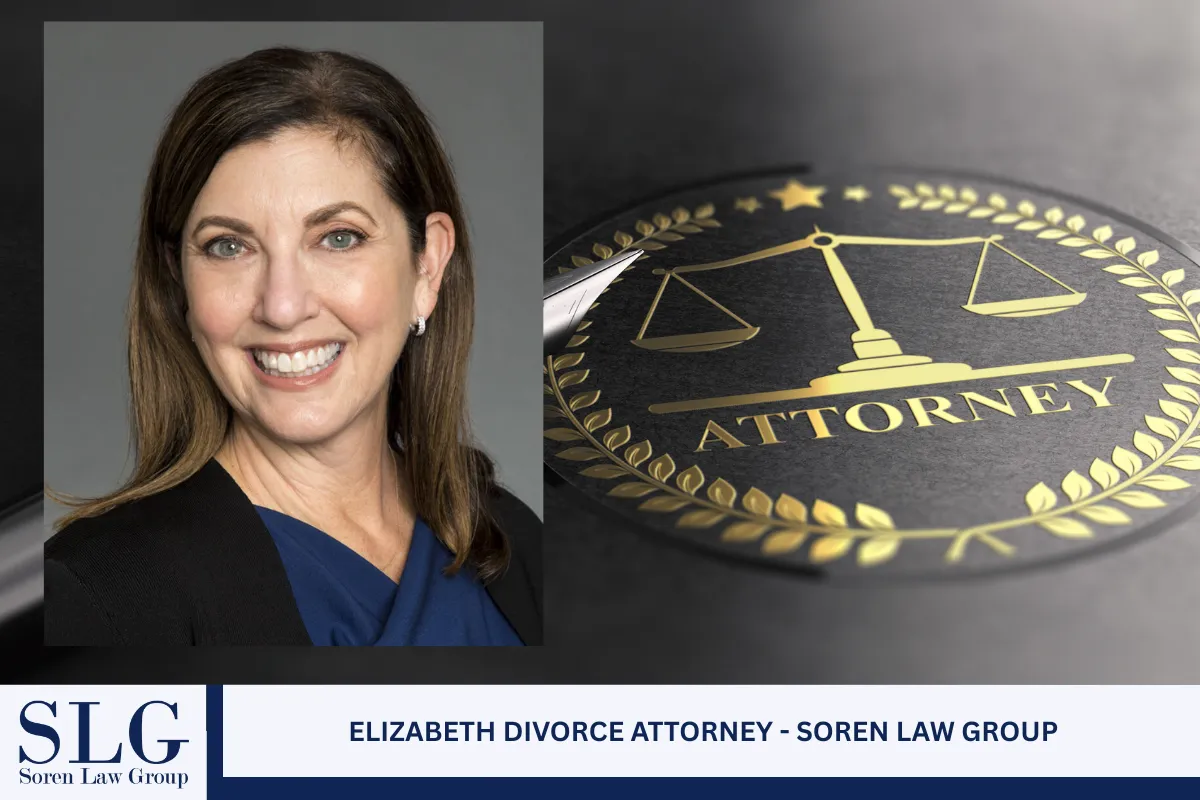
At Soren Law Group, we understand the challenges you face when dealing with an uncooperative spouse in a divorce. Our dedicated divorce attorneys are here to guide you through every step of the process with compassion and professionalism. We know that divorce is never easy, especially when your spouse is making it more difficult, but we are committed to protecting your rights and ensuring that you receive the fair outcome you deserve.
We specialize in all aspects of family law, from complex child custody disputes to asset division and alimony negotiations. Our experienced team is ready to advocate for your best interests and ensure your voice is heard in the courtroom. If you are facing a difficult divorce situation in Elizabeth, NJ, don’t let an uncooperative spouse slow you down. Contact us at (718) 815-4500 for a consultation, and let us help you navigate this challenging time with confidence.
Fheb – SEO Content Specialist said:
Frequently Asked Questions About Divorce in Elizabeth, NJ
1. What is the difference between a contested and an uncontested divorce?
A contested divorce occurs when both parties cannot agree on one or more aspects of the divorce, such as property division, child custody, or spousal support. In such cases, court proceedings are necessary to resolve the disputes. A divorce attorney will represent the interests of each party and help negotiate or litigate issues in court. The process can be lengthy and emotionally taxing, as it involves multiple court hearings and may also include a trial.
In contrast, an uncontested divorce is when both spouses agree on all issues involved, including the division of property, child custody arrangements, and financial support. The divorce petition is filed, and the court typically grants the divorce decree without the need for a trial or extensive court intervention. The process is quicker, less stressful, and often more cost-effective. Working with a family law lawyer can help streamline an uncontested divorce, ensuring that all legal documents are properly filed and that all legal procedures are followed.
2. How long does it take to finalize a divorce in New Jersey?
The duration of a divorce in New Jersey can vary depending on the complexity of the case, whether the divorce is contested or uncontested, and how quickly both parties can reach agreements on key issues. In an uncontested divorce, the process can take as little as 3 to 6 months. Once the divorce petition is filed and all necessary legal documents are submitted, the court will schedule a hearing. If everything is in order, the divorce decree can then be issued.
For a contested divorce, the timeline can be significantly longer. Disagreements over property division, custody, and spousal support often require multiple court hearings and negotiations. A high-conflict divorce may take over a year to resolve. Additionally, delays can occur if either party fails to appear at court dates or respond to legal notices. In some cases, temporary orders may be necessary to address immediate concerns while the divorce is in progress.
3. What is a default divorce, and how does it work?
A default divorce occurs when one spouse fails to respond to the divorce papers or does not participate in the divorce proceedings. If the spouse who is served with the divorce petition does not respond within the required time frame, the filing spouse can request a default judgment from the court. This means the court will grant the divorce without further input from the non-responding spouse.
In New Jersey, a process server typically serves legal notices to ensure that the other party is aware of the divorce petition. If they fail to respond or appear in court, the court may issue a default divorce decree. However, this may not automatically resolve issues like property division, child custody, or spousal support. In such cases, court intervention may still be necessary to finalize the divorce terms.
4. How does property division work in a divorce in New Jersey?
In New Jersey, property division is governed by state laws that follow an equitable distribution system. This means that marital property is divided fairly, but not necessarily equally, between the spouses. A divorce lawyer will help ensure that assets are properly identified and valued, and that the division is based on factors such as the length of the marriage, each spouse’s financial contributions, and future needs.
Property division can be a contentious issue, particularly in high-conflict divorces. If one spouse is not cooperative, it may involve lengthy and complex court proceedings. It’s crucial to disclose all legal documents related to assets, including bank statements, tax returns, and retirement accounts. A legal team can help negotiate a fair distribution or represent you in court hearings if the matter cannot be settled amicably. In cases of fault divorce, the conduct of each spouse may also impact how property is divided.
5. What are the legal options if a spouse refuses to cooperate during a divorce?
If your spouse refuses to cooperate during a divorce, you have several legal options. First, you can attempt collaborative divorce or mediation. These processes enable both parties to work together, with the assistance of a neutral mediator or collaborative lawyers, to reach an agreement without the need for a trial.
However, if these methods fail, the next step may involve court intervention. You can request temporary orders from the court to address immediate concerns, such as custody or financial support, while the divorce proceeds. If necessary, you may also file motions for court hearings or court orders to compel your spouse to comply with legal procedures.
In extreme cases, you may pursue a default divorce if your spouse fails to respond to the divorce papers or attend court hearings. In a fault divorce, you may also seek specific remedies if your spouse’s actions (such as adultery or abandonment) significantly impacted the marriage. It’s essential to consult with a family law lawyer to explore your legal options and determine the best course of action for your situation.
Read more: Why Consulting a Divorce Attorney in Elizabeth, New Jersey, Speeds Up the Process

